The Royal Road across Krakow
The Royal Road is the ceremonial route that kings and other
celebrities proceeded through Krakow when the city was
Poland’s capital. Now it still links most of Krakow's
Old Town's landmarks. The monarchs entered through the main
of the city's eight gates, the Gothic Florianska gate of circa 1300 and – since
1499 – the mighty Barbican before it (both have survived
complete with the adjacent city walls and towers). From the
gate the Florianska street, as always Krakow’s
busiest, leads to the central square. At 45 Florianska
street the Jama Michalika cafe boasts period art
nouveau decor of 1895; at no. 41 there is The House of Jan Matejko where the great
19th-century painter’s lived, now turned into his
museum. The street ends at the foot of the 14th-century
Gothic basilica of the Virgin Mary’s,
the city’s best known church. Every full hour the ancient Krakow Signal resounds four times from its
taller, crowned tower. The basilica overlooks the
Rynek Glowny central square – Europe’s largest medieval
city plaza – with the Renaissance
Cloth Hall of 1555 in the middle of it and the
13th-century Gothic Town Hall Tower near by. In the square’s
southern corner a tiny church of the 11th century stands:
the church of St. Adalbert’s (Swiety
Wojciech in Polish), its original Romanesque architecture
hardly concealed by a Baroque renovation. One block down
Grodzka street a square is flanked by two grand 13th-century
temples. On the right-hand side there is the Romanesque basilica of St. Francis’, famous for the late 19th-century splendid stained-glass modernist windows
and floral frescos, with the adjacent Franciscan monastery.
To the left, the Gothic basilica of
the Holy Trinity towers over the
adjoining Dominican monastery. Both monasteries boast
medieval great cloisters, rich in church art, that date back
to the 14th century. The Franciscan monastery abuts on the
Renaissance Wielopolskich Palace of 1560 that has been
turned into the city hall in 1865. Halfway up Grodzka street
a turn right to Senacka street and next instant left bring
strollers to the most spectacular
Kanonicza street with its stately historic houses. In
the middle of Kanonicza street a charming square opens to
the white facade of the Jesuit august Baroque
church of SS Peter and Paul’s of 1619 next to the
majestic Romanesque church of St.
Andrew’s of circa 1090. From 1951 to 1963 Father Karol
Wojtyla, future Pope John Paul II, lived at 19 and 21
Kanonicza Street (his former rooms have been turned into a
part of the Archdiocese Museum, otherwise
exhibiting church art). The street ends just at the foot of
the Wawel Royal Castle on the top of the
Wawel Hill and next the Royal Road climbs up the
elevation to the compound's double gates, of the 20th century and
the
17th century respectively. The steps on the left side behind the
second gate lead to the Wawel
Cathedral. Little further, after turning left, one finds
the entrance to the Royal Castle’s splendid Renaissance
courtyard.
Select restaurants
on the Royal Route.
Any following information has been provided by respective
restaurants on their sole responsibility.
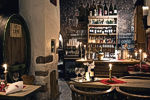
Pod Aniolami
restaurant
Polish cuisine.
The Pod Aniolami – “Under
the Angels” restaurant is an extraordinary place, famed far
and wide for its marinated meats, grilled over beech
hardwood fire, and other old Polish dishes. The restaurant’s
historical 13th-century interiors and brilliant
cuisine, based on the Polish culinary traditions, will make
you soak up the atmosphere of the Medieval Kings’ City of
Cracow. At “Under the Angels” time stood still and one can
still find the ambience of old Cracow here. Beautiful
interiors and excellent cuisine attract renowned guests from
all over the world. On the ground floor we invite you to The
Chamber of the Wawel Castle’s Comptroller where one can
admire the 18th-century polychromes during private banquets.
There is also a charming year-round open garden with
a mosaic fountain to which one can always drop a coin
wishing to come back to this unusual place.
Meal for two without wine -
about
40 euro
Address: 35 Grodzka street.
Phone:
(+48) 124213999.
Krakow's
walking itineraries
The best way to enjoy old Krakow is afoot.
Stroll Round the
Grand Square
Stroll through
Krakow's Kazimierz District
Planty walk round the Old Town
In the footsteps
of Pope John Paul II
|
City Walls
700-year-old main city gate with adjoining mighty walls
and towers.
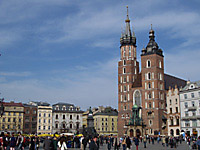
Basilica of the Virgin Mary's
The immense Gothic church, Krakow's principal temple
since the 13th century, shelters the world's greatest Gothic sculpture among its many excellent works of art.
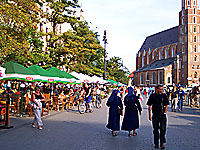
Grand Square
Krakow’s central Grand Square (Rynek Glowny), the
largest plaza of medieval Europe and one of the world’s finest
with its spectacular landmarks, has remained the hub of the city
since the 13th century.
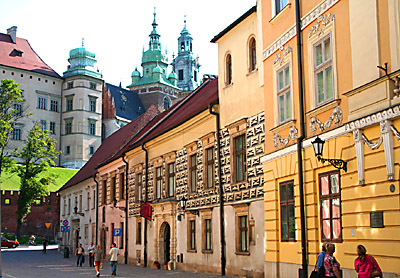
Kanonicza Street
The most beautiful of Europe's ancient streets,arguably.
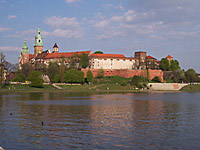
Wawel Royal Castle
Home to three dynasties of Poland's monarchs. Its
stately halls and exquisite chambers are filled with priceless
art, best period furniture and rare ancient objects. The
collection of the 16th-century monumental Flemish
tapestries is matchless.
Wawel Cathedral
Poland's impressive national shrine shelters plenty of
superb church art. Its giant bell of 1520 ranks with the
world's largest. Most Polish kings and their family members are
buried in the cathedral, its chapels and crypts.
|







